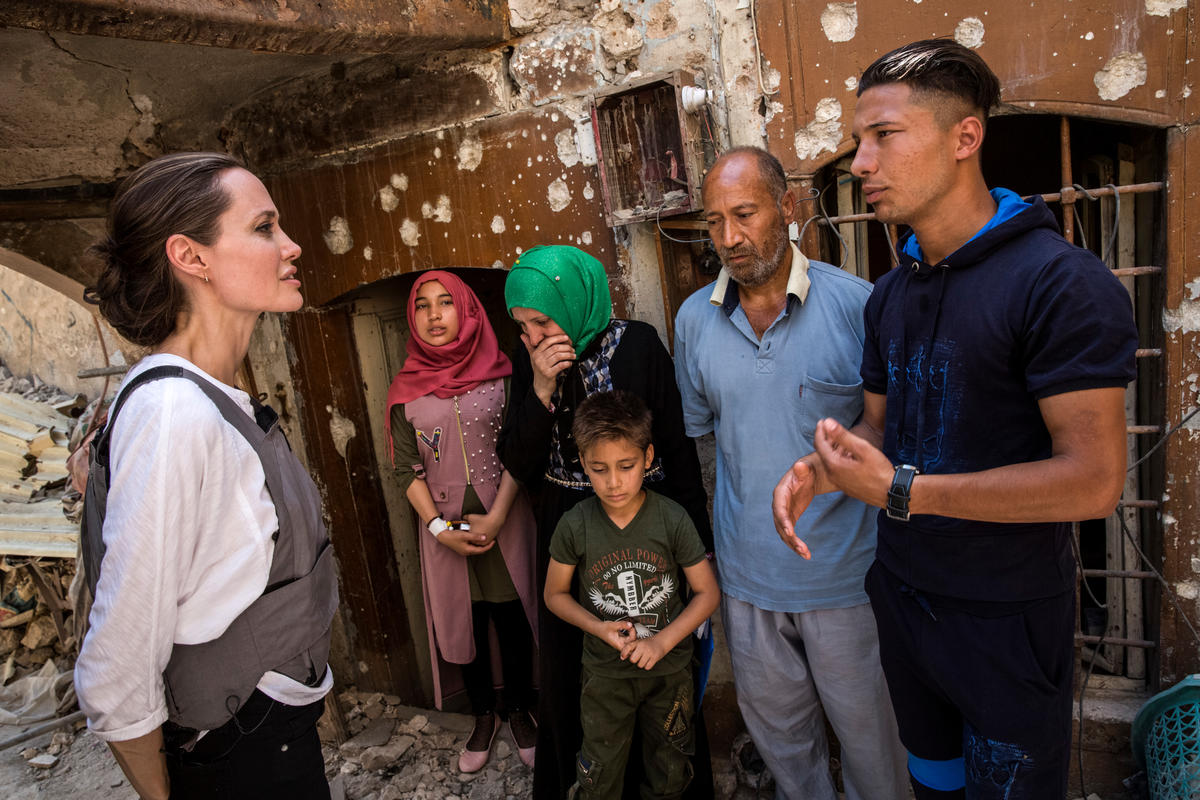Angelina Jolie visits West Mosul, where Iraqi families are returning home to ruins

Angelina Jolie visits West Mosul, where Iraqi families are returning home to ruins
UNHCR Special Envoy Angelina Jolie today visited West Mosul, an urban area held captive by ISIS for three years until its liberation last summer. After walking among the bombed-out buildings that line its quiet streets and meeting with some of the first families to return, she urged the world not to forget the agonies they have endured – and not to ignore the new struggles they now face.
“This is the worst devastation I have seen in all my years with UNHCR,” said Jolie, speaking in front of the ruins of al-Nuri Mosque in the Old City. “These people have lost everything, and the trauma and the loss that they have suffered is unparalleled.”
The Special Envoy marvelled at their ability to carry on, despite the world’s seeming indifference.
“I have no words for the strength it must take to rebuild after loss like this,” she said. “But that is what the people of this city are doing. They are grief-stricken and traumatized, but they are also hopeful. They are clearing their homes with their own hands, and volunteering and helping each other. But they need our assistance.”
“This is the worst devastation I have seen in all my years with UNHCR."
The visit marked Jolie’s 61st mission – and fifth to Iraq – with the UN Refugee Agency since 2001. It coincided with the second day of Eid al-Fitr, with many residents planning to spend the day with relatives to celebrate the end of Ramadan. At this time last year, heavy gunfire, shelling and air strikes rocked the city, still weeks away from freedom.
People who had fled to East Mosul or to camps south of the city are now slowly returning. But they are coming home to scenes of epic destruction. Not one structure is unscathed. Not one pane of glass is unbroken.
One local family showed Jolie the damage to their ancestral home, built a century ago. Mohamed, 47, spoke of how he was born and married there, and how a mortar tore through the roof one morning last June, gravely injuring his 17-year-old daughter. When they carried her to get medical care, he said, they were turned away and she bled to death.
“Zubayda was very sociable and energetic, very simple and generous,” he said, tears gathering in his eyes. “If she had only one bite to eat – and food was very limited then – she would give it to her siblings.”
For the time being, nearby friends have taken in Mohamed, his wife Hoda and their three surviving children. But the space is too crowded to stay there much longer.
“I want to rebuild the house and come back here,” Mohamed said. “Even if I have painful memories in this house, where else would I go? I have to come back home.”

Throughout Mosul, Iraq’s second-largest city, some 40,000 homes are in need of rehabilitation. UNHCR and its partner, Human Appeal, have begun to provide cash assistance to returning families so they can repair or rebuild their homes. The initiative aims to reach 1,500 families this year.
Without such assistance, the families returning here risk sliding deeper into poverty. Overwhelmed by the lack of shelter, infrastructure, services and jobs, thousands are being displaced again and seeking shelter in camps outside the city.
So far, efforts to rebuild are modest. In West Mosul’s al-Zanjely section, several residents were seen earlier this week mixing cement, laying tile and running electrical wires for when the power occasionally comes on. Young men riding on the back of a truck delivered blocks of ice for refrigeration.

One family who has lived here for generations told Jolie of their plans to rebuild as soon as the paperwork is in order. The father, named Mohamed, used to run an interior design boutique next door, but it was destroyed along with their home during the fighting.
His eight-year-old daughter, Falak, has gone without treatment for a gene disorder since the doctor fled two years ago. Militants killed her cousin right in front of her, a traumatic experience that haunts her still. “Even now when our children hear fireworks, it terrifies them,” Mohamed said. “They are traumatized.”

It was also here in al-Zanjely that Jolie met Hassan, a 33-year-old vegetable vendor who spoke of losing his home twice: first when militants confiscated it, and then when an air strike reduced it to rubble. He and his wife Lamiaa, along with their three young children, are renting space in a modest house with another family.
Their girls returned to school this year and proudly showed the Special Envoy their report cards. Each ranked at the top of her class.
Their father, meanwhile, applied for cash assistance to rebuild their home. Since receiving the first instalment two weeks ago, he has wasted no time. He finished the first phase in time for Eid, erecting several new walls, windows and doorways. Soon he will begin work on the roof.
“This is home. Where else would I go?”
“This is home. Where else would I go?” Hassan said. “This is my country, my people, my neighbours. Why would I go? One doesn’t leave his home.”
Such resolve may be a crucial element in building a stable future in Mosul, Iraq and the region. But people like Hassan will need more support from a world that has turned its eyes away.
“It is deeply upsetting,” Jolie said, “that people who have endured unparalleled brutality have so little as they try, somehow, to rebuild the lives they once had.”










